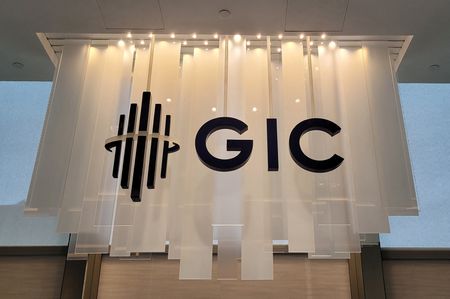By Anshuman Daga and Yantoultra Ngui
SINGAPORE (Reuters) -Singapore sovereign wealth fund GIC said it continues to scout for long-term investment opportunities in China, looking at a wide range of industries, adding that it maintains significant exposure to large markets such as China.
The statement comes after the Financial Times reported earlier in the day that GIC had put the brakes on private investments in the world’s second-biggest economy as it steps up scrutiny of risks.
GIC also scaled back commitments to China-focused private equity and venture capital funds over the past year, the FT said, citing unnamed sources.
“While the overall investment environment in China saw a slowdown in deal-flow last year, our on-the-ground team continues to explore long term opportunities across many sectors due to a rising middle-class, an entrepreneurial private sector, as well as China’s decarbonisation efforts,” a GIC spokeswoman said in an emailed statement to Reuters on Tuesday.
GIC is the world’s fifth-biggest sovereign investor with $690 billion in assets, according to research firm SWFI. It counts large listed Chinese companies in its portfolio and has not announced any big sales of privately held Chinese companies over the past year.
“With China’s domestic market size, there is good potential for investors to invest in good companies and grow with them over the long term,” the statement said.
In the year to March 2022, the United States was GIC’s biggest market, making up 37% of its portfolio while Asia excluding Japan contributed 25%.
Following a sweeping regulatory crackdown in China in 2021, venture capital investment fell sharply last year, with many investors nursing losses on Chinese portfolios. Globally, venture capital investment has also fallen sharply due to a sell-off in equity markets.
GIC’s group chief investment officer Jeffrey Jaensubhakij has also said China’s regulatory environment had become much clearer.
Investors could benefit by investing in small companies in China and GIC was working with companies and other investors on such opportunities, he said in a panel discussion at the World Economic Forum in Davos last month.
(Reporting by Anshuman Daga and Yantoultra Ngui; Additional reporting by Shivani Tanna in Bengaluru; Editing by Himani Sarkar and Edwina Gibbs)

